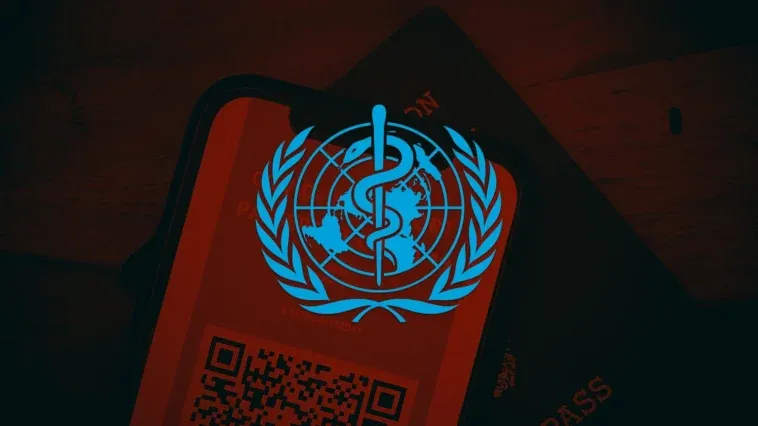(Reclaim The Net) The WHO laid out its plans for global vaccine passports in a series of proposed amendments to the International Health Regulations (2005) — a legally binding instrument that imposes various conditions on 196 countries when the WHO declares certain types of health emergencies.
As governments around the world wind down their vaccine passport programs, the unelected World Health Organization (WHO) is attempting to make this Covid-era surveillance tech permanent and global.
Related: How vaccine passports are crushing freedom, privacy, and civil liberties
The WHO laid out its plans for global vaccine passports in a series of proposed amendments to the International Health Regulations (2005) — a legally binding instrument that imposes various conditions on 196 countries when the WHO declares certain types of health emergencies.
The movement to amend these International Health Regulations (IHR) began in January last year when the Biden administration quietly pushed for major changes. Since this initial push, other member states have proposed their own amendments and the total number of proposed changes now sits at 307.
These proposed amendments give the WHO new powers to declare “potential” health emergencies and include commitments from member states to recognize the WHO as the “coordinating authority” during certain types of health emergencies.
They also outline how the WHO intends to use its new powers to push global vaccine passports when it declares “potential or actual” health emergencies.
The current version of the IHR already allow the WHO to issue recommendations to “review proof of vaccination,” “require vaccination,” and “implement tracing of contacts of suspect or affected persons.”
However, these proposed amendments to the IHR greatly expand on the existing recommendations and lay out a framework for digital vaccine passports and other forms of digital tracking.
New text has been added that allows member states to require “documents containing information for a lab test in digital or physical format” and “information on vaccination against a disease.”
Another amendment states that “documents containing information concerning traveller’s destination…should preferably be produced in digital form, with paper form as a residual option” and suggests that this will be used for contact tracing.
One amendment paves the way for “other types of proofs and certificates” which “may be designed by the Health Assembly” (the WHO’s decision-making body) and will be used to “attest the holder’s status as having a decreased risk of being the disease carrier. These other proofs include test certificates (which provide proof someone has been tested for a disease) and recovery certificates (which provide proof someone has recovered from a disease).
Not only do these proposed amendments to the IHR push for post-Covid vaccine passports, digital proofs, and digital certificates but they also state that “vaccination certificates should be considered approved” when the WHO has declared a public health emergency of international concern (PHEIC) and there’s “a scenario of voluntary vaccination using products still at the research phase or subject to very limited availability.”
Additionally, they mandate that digital health documents “incorporate means to verify their authenticity via retrieval from an official web site, such as a QR code.”
And it doesn’t end there. These proposed amendments also lay out a “minimum” and “maximum” scenario for the data to be collected via this proposed vaccine passport and digital certificates scheme.
At minimum, the WHO wants vaccine, test, and recovery certificates to contain a person’s name, national identity number, passport number, type of vaccine, vaccine batch number, date of administration, place of administration, and an official stamp.
In the maximum scenario, the WHO wants these digital certificates to contain all of the data from the minimum scenario plus a person’s vaccination history and a QR code that supports the retrieval of vaccination information.
We obtained a copy of the full list of proposed amendments to the IHR for you here.
We obtained an article-by-article compilation of the proposed amendments to the IHR for you here.
These suggested amendments to the IHR have faced some political pushback. However, the WHO continues to march forward with its plans.
Last week, the WHO held a meeting where a WHO working reviewed the proposed amendments to IHR, agreed on the next steps for more intensive negotiations, and planned for their next meeting which will be held from April 17 till April 20. The amendments are expected to be finalized by May 2024, according to a provisional timeline.
We obtained a copy of this provisional timeline for you here.
The WHO intends to adopt these proposed amendments under Article 21 of the WHO Constitution. If the amendments are finalized, member states will be given “due notice” and have a six-month window to reject them before they come into force.
The WHO Constitution doesn’t state how many votes are needed to amend regulations but according to SWP Berlin, a research institute that provides guidance on foreign and security policy, WHO regulations have a lower voting threshold than conventions (which need a two-thirds majority vote).
If these proposed amendments get to this stage, many of the votes will be cast by diplomats who are appointed and not elected — a process that contrasts with the usual democratic legislative process where elected officials vote on laws that affect their constituents.
The WHO was a big fan of vaccine passports during the coronavirus pandemic and has been working on a global vaccine passport system since early 2022. However, these previous efforts didn’t attempt to usher in global vaccine passports via international law.






